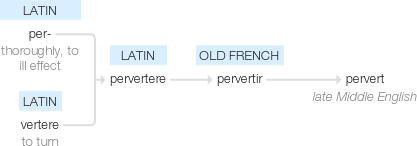Pervert
late Middle English (as a verb): from Old French pervertir, from Latin pervertere, from per- ‘thoroughly, to ill effect’ + vertere ‘to turn’. The current noun sense dates from the late 19th century.
wiktionary
From Old French pervertir, itself from the Latin pervertō.
etymonline
pervert (v.)
late 14c., perverten (transitive), "to turn someone aside from a right religious belief to a false or erroneous one; to distort natural order, misdirect misapply (justice, law, truth, etc.); to turn (something or someone) from right opinion or conduct," from Old French pervertir "pervert, undo, destroy" (12c.) and directly from Latin pervertere "overthrow, overturn," figuratively "to corrupt, subvert, abuse," literally "turn the wrong way, turn about," from per "away" (see per) + vertere "to turn, turn back, be turned; convert, transform, translate; be changed" (from PIE root *wer- (2) "to turn, bend").
Related: Perverted; perverting. Replaced native froward, which embodies the same image. Old English had mishweorfed "perverted, inverted," an identical formation to the Latin word using native elements.
pervert (n.)
1660s, "one who has forsaken a doctrine or system regarded as true, an apostate," from pervert (v.). Psychological sense of "one who has a perversion of the sexual instinct" is attested from 1897 (Havelock Ellis), originally especially of homosexuals.
